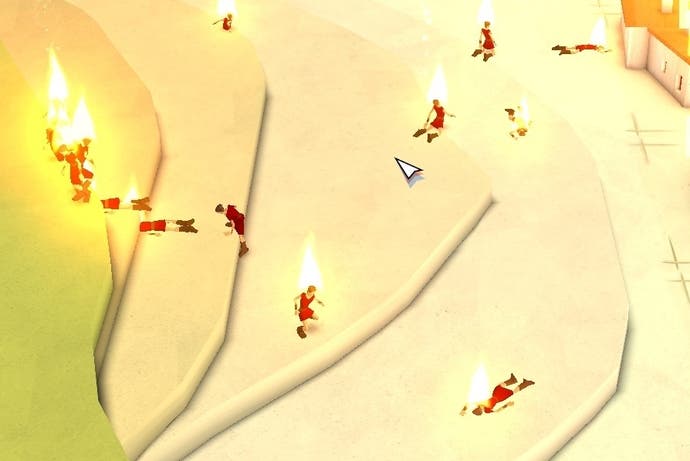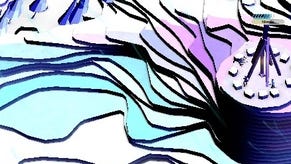Godus 1.3.1 alpha review
Flatland.
Eurogamer's alpha and beta reviews are reviews of games that are still in development but are already being offered for sale or funded by micro-transactions. They offer a preliminary verdict but have no score attached. For more information, read our editor's blog.
You've never seen a wolf like the wolves in Godus. Down from the hills they come, arms and legs fixed firmly in position, terrorising villagers as they glide, unanimated, like furry Roombas.
The lack of articulation actually makes them surprisingly creepy, but there's something else that's interesting about them too. These wolves serve as a vivid reminder that, for all Godus' surface polish, it's still early on in its development. The game is a marketing-friendly 41 per cent complete if the text on the opening screen is to be believed, and that's a statistic that's worth returning to as you play - particularly since the 41 per cent in question is crash-happy, conflicted and tedious. Godus is often pretty and occasionally charming, but its current incarnation has no respect for its players' time. 22Cans is making a busy game, but at the moment it's a busy game in which little of true consequence happens.
Eventually, it may be very different. Godus ultimately promises players the opportunity to live as a deity, Populous-style, shepherding followers from primitive life through to the era of space travel. There will be a single-player campaign with a crazy storyline, and there'll be a huge multiplayer world where all the gods toil together, making alliances, declaring war, and even taking on the god of gods - a chosen player with the power to change certain variables, who also receives a cut of the profits. The game will be available on PCs and Macs and smartphones. 22Cans wants Godus to be everywhere, all the time: a persistent playground of creativity and conflict.
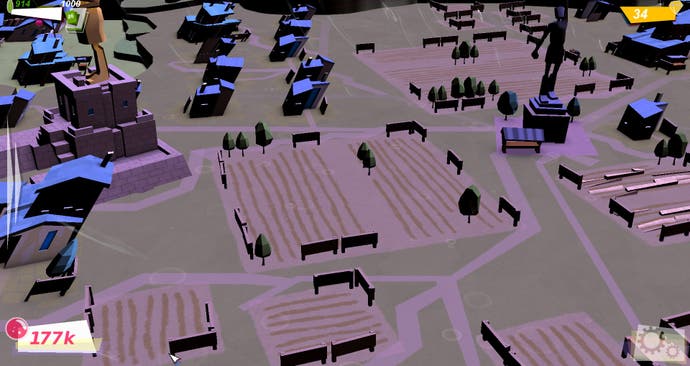
What you actually get from the current early access build is pretty basic. This is no server-testing beta but a genuine paid alpha in which feedback is sought and new systems come online with every update.
As of yet, there isn't much you could call meaningful gameplay. Fire up build 1.3.1 of Godus and you're allowed to push your way through the first part of the progression system, from the dawn of your rule amidst a mere handful of followers and on to the bronze age where agriculture starts to gear up. You get to explore a pre-prepared island and a decent chunk of continent that lies beyond it, and you get 20 battle scenarios to tackle, playing against AI.
What you don't get is much sense of conflict or jeopardy. AI instances aside, as of yet, there are no rival tribes to struggle against as you move across the landscape, no moments that require canny thought or strategic nouse. Instead, it's probably best to think of the current build as a test of some of Godus' most basic systems and mechanics. I'll call it a game for the sake of simplicity, but it really isn't a game at all. Not yet.
Still, Godus starts beautifully. The first two minutes are great. In the beginning was the world: the camera swoops over a tantalising vista of mountains, forests and mediterranean beaches, all delivered in a voguish low-poly art style and with those ordnance survey layers of earth that give the landscape a kind of stepped effect. It's as instantly recognisable as Minecraft, and as you're finally deposited above a stretch of sand and set the task of clearing away rocks and palms so your followers can start building huts, it seems tremendously exciting.
A quarter of an hour later, though, Minecraft will be a rather more problematic association. Its creator Notch throws you into a rugged wilderness and allows you to alter it in ways that are at least as thrilling as the landscape that the procedural generation has already built for you. Godus, meanwhile, taking a few nods from Populous, is currently a game in which the best strategy is always to make things flat. It looks like a game about creativity, but it currently has no use for your powers of invention. You move across the terrain cancelling out mountains and filling in valleys. Before you lies paradise, behind you trails an endlessly unfolding slab of neolithic carparking. You're god, and god seems to want to recreate Sittingbourne town centre, circa 1978. There's probably a hotkey for sticking in a Wimpy's.
"You're god, and god seems to want to recreate Sittingbourne town centre, circa 1978"
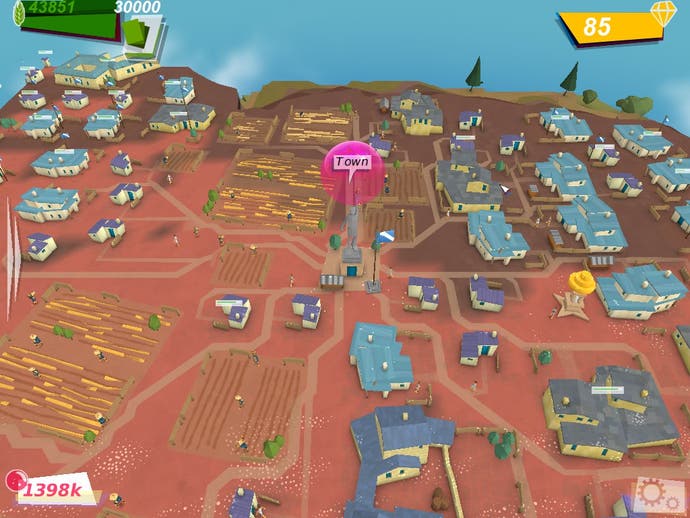
The pacing comes with the territory. For the first few hours you're meant to focus all your attention on growing your ranks of followers, and you do this by smoothing out the land and decluttering so that they can build abodes for themselves, classic God game-style. Abode plots are placed automatically as soon as there's room for them, and as your population increases, your area of influence expands and you can manipulate more and more of the world, eventually hunting down resource chests and repairing ancient shrines, all of which tie back into your progress through prehistory.
This all takes a lot of clicking. Seriously. When your followers are ready to do something, their abodes produce a little flag that you can click to summon them for work. You also click to clear trees or rocks to open out space and to generate belief, and you click to collect more belief from your followers' abodes. You can then use this belief to power any godly interventions you might have in mind.
The most crucial of these is land manipulation, a process that sees you tugging at those ordnance survey steppes to create new territory or squeeze hills and mountain ranges out of existence. Tugging land around takes a lot of clicking too, as it happens, because you can't click and drag terrain very far at once. Instead, you'll click the ground, pull it an inch or so, and then you have to re-click and re-drag. This sounds like small beans, perhaps, but you're going to be doing it a lot, and although you can eventually power up your abilities until you're grabbing multiple layers of earth at once and sculpting fairly steep cliffs, you're still clicking and clicking again more than any human would ever conceivably wish to.
Perhaps it's implemented in such a time-intensive manner because, if it worked any differently, the whole game would be over in a few breezy minutes. On the seventh day, I made another car park. Time for Armageddon yet? The cost of this approach, though, is that Godus' key materials aren't a lot of fun to work with. The layers of earth feel sluggish and often slimy, and they can ooze unpredictably at times, wasting precious belief by retreating when you want them to expand, say, or gayly rolling over an innocent follower's abode, reducing it to rubble. I am a vengeful god, it transpires, but only by accident.
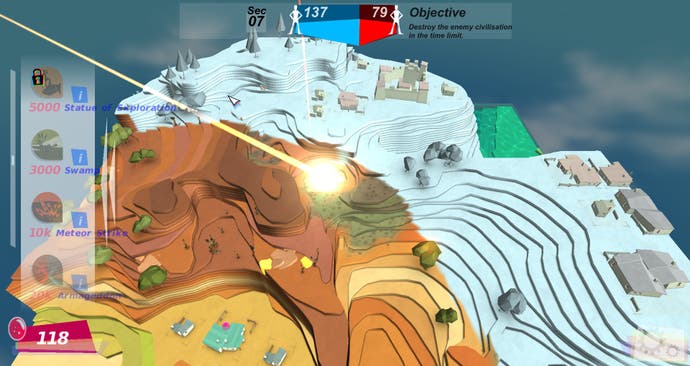
Speaking of followers, before too long you're going to have an awful lot of those abodes knocking around - dozens, most likely - and they all need clicking to gather belief and summon workers. Prior to the most recent patch, you had to click on them individually forever, turning the process of wielding vast religious powers into little more than an endless game of whack-a-mole. Now, in 1.3.1, you quickly earn the right to organise settlements, placing a building that connects any nearby abodes with roads and gathers the belief - and the flags - they produce in a single central location.
This is lovely in principle, but a lot of the clicking remains when it comes to summoning workers, and the settlements themselves suggest some annoying thinking on the behalf of the design team. Settlements quickly move from costing belief to costing a separate currency, gems, which can be mined in limited numbers from golden patches of terrain. Despite the fact that clicking on the gem icon brings up a message that there is no gem shop available - it was planned, apparently, and has now been scrapped due to the fact that everybody seemed to hate the idea - it's hard to see this as anything other than a mechanic that was at least conceived with micro-transactions in mind. The dual currencies suggest as much, as does the fact that, when it comes to settlements, you're paying for something that, during the primitive stages of the game, only really exists in order to make something else that's already been imposed on you a lot less irritating. Clicking endlessly to harvest belief or squish flags on thousands of houses is not good game design whichever way you slice it - but potentially allowing people to avoid doing that for a fee probably seemed like good financial design. (Or effective financial design, anyway.)
Granted, there's nothing to buy now, but the worst sort of micro-transaction thinking seems to hover over Godus quite heavily. It is, after all, a game that requires endless player interaction, but keeps that interaction, for the first dozen hours at least, at the level of gathering resources or creating space for new buildings. You're clicking when you should be planning. You're clicking when you should be strategising.
Maybe this will change as the game evolves. Agriculture, when it arrives with the bronze age about 15 hours in, already shifts the focus away from growing the population to growing crops - and it pushes you back to settlements again and the need to farm gems, since farmers, who tend crops, emerge from settlements. Still, at least there's the hint of a deeper game here. At some point, when agriculture's vying with a handful of other ideas, you may finally need to consider the make-up of your settlements, and even think about specialisation in certain areas of the map to produce different resources. Settlements may become more meaningful in general. So far, though, I'm over 30 hours into Godus, the map has stopped expanding, and I've yet to make a single strategic decision worth talking about. The strategy I'm pursuing is the only strategy that matters to Godus in its inchoate alpha form: make it bigger and make it flatter and click-click-click.
"The strategy I'm pursuing is the only strategy that matters to Godus in its inchoate alpha form: make it bigger and make it flatter and click-click-click"
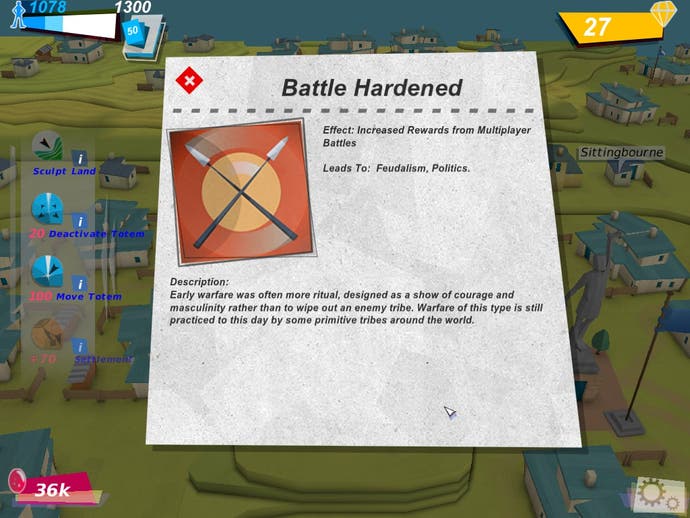
Perhaps there's a little more to it than that. As your area of influence grows, your population spreads further, and you start to reach shrines dotted around the map. Hitting population milestones - and getting your followers to repair shrines - starts to earn you cards, the means by which Godus allows you to advance through the ages. Alongside standard land expansion cards, you'll also discover cards that cover things like technology, science, and the military - cards that might allow you to build better houses, say, or give you a nice offensive power to use in battles.
These cards are then stored in the history book of your people - a sort of Panini sticker album for your god to flip through. This is a sweet idea but one that, when coupled with your limp strategic options, serves to reinforce the sense of a game where even the most basic elements of the design struggle to create meaningful ways for players to express themselves. It's such a strange contradiction: you can do whatever you want to the landscape in Godus - shape mountains just so, create weird tiered sculptures. Ultimately, though, none of this actually matters as long as you've got enough flatness going on to keep your population growing and the cards coming in. The game doesn't know how to cope with genuine playfulness so it just ignores it - and, unlike Minecraft, the playfulness it does allow for isn't interesting enough to keep the game afloat by itself. In terms of interesting, viable approaches to empire-building, with no rival tribes patched in yet, the whole thing is currently a non-starter, and while the 1.3.1 build offers a slightly faster game, it's no less mindless.
It doesn't help that the resource system that currently powers the cards is absolutely barmy. Most cards will require resources in order to unlock them: if you want your followers to have shoes, say, or politics - and what kind of god doesn't want their followers to have at least one of those? - you'll need to gather the felt, seeds, timber, rock, plaster and whatnot those cards demand. This turns out to be an opportunity for Godus' designers to remind you that none of the game's metaphors work. Chopping down trees and smashing boulders is just about the first thing you do in Godus, and you continue doing it throughout the course of your expansion. This doesn't grant you wood or rock, though. It grants you belief, which you can use to dig into the landscape and locate buried chests - some of them are underwater - that are in turn filled with wood or rock - or felt, or plaster, or seeds - pre-packaged for you.
That's a pretty zany way of handling things, 22Cans! It makes sense, I guess, as a means of encouraging players to tinker with the environment after your own control scheme has rendered tinkering a bit of a faff. The treasure hunt for resources gives the game a sense of pace, too, but it also transforms the main thrust of the campaign into one of the most timid, controlled, and linear of progression systems imaginable - particularly when the cards you're unlocking are no great shakes either. Smiting enemies with meteors is pretty fun, but debate, for example, which sounds potentially entertaining, actually translates into a simple boost to the amount of belief you get from settlements. And that's one of the better cards.
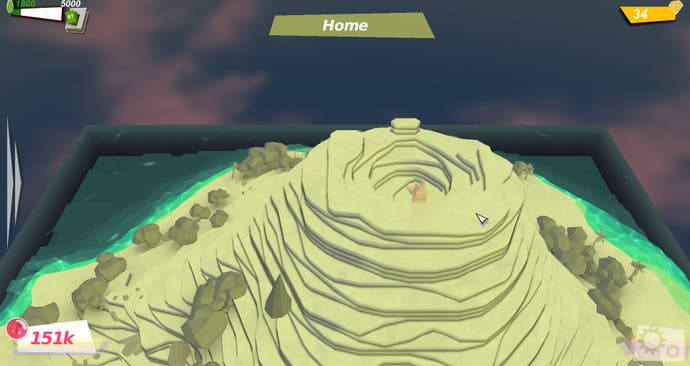
Ah, meteors. These come into their own in the two-player battles (faked against AI for the time being) that are currently the most consistent source of fun in Godus: little discrete maps where you and your foe must build a population, overrun the opposition, or mine the most gems within a time limit. It's basic stuff - and the AI cannot compete for toffee - but the hyper-speed land grab is surprisingly compulsive, and there's at least a little lightweight decision-making to be done as you ponder whether to splurge belief resources as often as possible on a Finger of God move that allows you to flatten individual houses, or save up for that meteor strike that will do real damage. There's a lot of balancing needed before it's challenging - a handful of Last Man Standing games can be completed in seconds by prodding your enemy to death while he gets his numbers up - but battles, even against faux players, are pretty pacy, and suggest that when more true multiplayer permeates the main game, it might start to come to life.
Ultimately, the main question regarding Godus is fairly simple: when you buy into the early access build, are you looking at a potentially interesting game that feels boring because it's still in development, or are you witnessing the development of a boring game that will never be particularly interesting anyway? Crucially, after several days of clicking, I'm still not entirely sure what kind of game Godus is meant to be in the first place. I initially suspected strategy, but strategy is the thing Godus is currently weakest at. Instead, build 1.3.1 is a cross between a treasure hunt and a very simple spatial puzzler, with fleeting elements of real-time warfare whenever you head to battle. Certainly, it's clearly a work-in-progress missing several central pieces, but the emphasis at the heart of the design already seems wrong-headed. 22Cans bogs its supposed gods down in micro-management, while the big picture is so controlled by the progression system that you don't really need to be thinking about it at all. There was more to Populous than this - and I suspect there was more to Populous when it was only 41 per cent complete, too.
"A good god game leaves you feeling like you've had a chance to run the world. 1.3.1 is more like being hired to lay somebody a backyard patio."
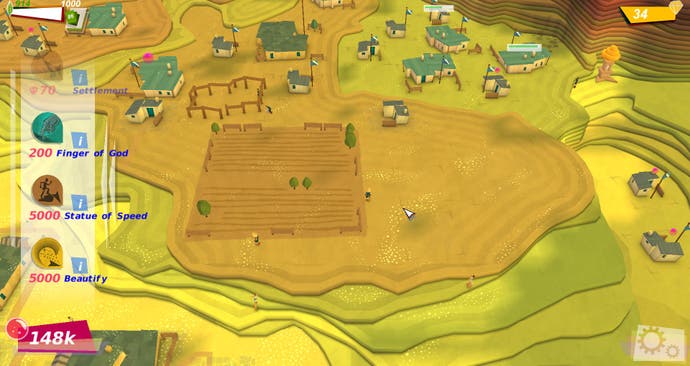
The game Godus actually reminds me of the most is Clash of Clans - in its emphasis on constant tap-based interaction instead of deeper player engagement, in its co-opting of strategy aesthetics in the service of something that's ultimately about fairly mindless expansion. As I cast an eye across the landscape I've built so far, I don't feel any attachment to it. No stories and no strategies emerged from the construction - it was just toil. A good god game leaves you feeling like you've had a chance to run the world. 1.3.1 is more like being hired to lay somebody a backyard patio.
With no real insight into Godus' design process, you can hope that this fabled 41 per cent is the hidden busywork, and that the actual dynamism of the game design is still to come. Build 2.0 should certainly be worth a look anyway, as it will hopefully bring players together properly and allow you to progress to the imperial age. Even now, though, there are already plenty of fundamental problems that are going to be hard to solve.
Eurogamer's alpha and beta reviews are reviews of games that are still in development but are already being offered for sale or funded by micro-transactions. They offer a preliminary verdict but have no score attached. For more information, read our editor's blog.
